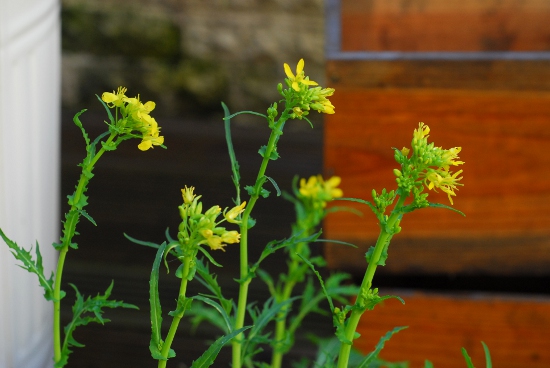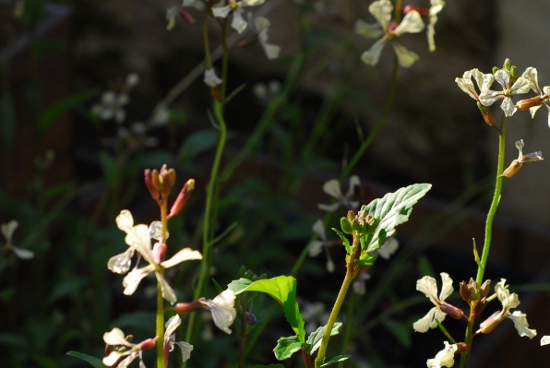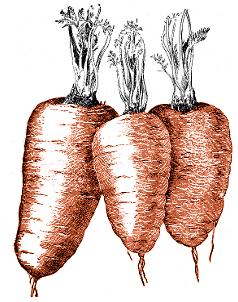Archive for February, 2012
Posted in Experimentation, Garden Diary, The Old Garden In Bristol on Wednesday, February 29th 2012 (5.51 PM).
In the last post, I mentioned that although the rocket is in bloom already, there weren’t any hoverflies about yet. The very next day, I saw the first I’ve seen this year. Orange and black, it had gone before I had chance to grab the camera. It was warm in Sunday’s sunshine, and I could occasionally also hear bumblebees nearby – presumably queens looking for a nesting spot. The only one I saw was a good twenty feet away, not quite close enough to attempt an identification.
I was in the garden, because I’d decided that, with the weather being so warm, it was about time I started getting some seeds in the ground. Don’t want to leave it too late, after all: last year, because of when we started, we didn’t exactly grow the mixture of things we wanted. So Sunday was spent clearing compost out of all the pots which had had last year’s annuals in, and sowing a very few new seeds. In one pot: a mixture of calendulas and lettuce. A bit of an experimental mixture, and I’m not at all sure I have given them enough space to get along. Indoors, on the kitchen window sill: peas, germinating inside to avoid tempting the local wildlife. Peas are damn tasty, after all.
calendula, hoverfly, lettuce, little gem, marigold, pea, sowing, spring, wildlife
Posted in Garden Diary, Photobloggery, The Old Garden In Bristol on Saturday, February 25th 2012 (7.46 PM).
As you might have noticed from the date of the last post, not much gardening has been done recently. Even though I went out to swap seeds, nothing yet has been sown. It has still felt cold and frosty, damp and grey, at least until a warm bright morning this morning. I went outside and noticed that the chives have started to wake up. Grown from seed last year, they did not come to much in their first year. However, they seem to be coming back again, because each plant now has a cluster of new shoots poking upward.
Moreover, the three boxes of rocket, which I had been intending to pull up, are bursting back into life too. The wild rocket had been laying low but hanging on, a carpet of foliage which managed to survive the frost and snow we had earlier in the month. This morning, I noticed that in the past week it has bolted and burst into flower.

The two boxes of garden rocket had even managed to keep their flowers all winter. These too, though, have started growing fresh flower shoots and buds recently.

Pulling them up is on hold for now: at this time of year, anything in flower deserves to be kept for the sake of the local insect wildlife. I do love letting the garden rocket go to seed: last summer each rocket flower stem was surrounded by a cloud of hoverflies for most of the day. The neighbourhood hoverflies are still waiting to emerge, but no doubt there are other hungry insects looking for nectar right now.
chives, flowering, garden rocket, rocket, spring, wild rocket
Posted in Practicalities on Sunday, February 5th 2012 (6.03 PM).
This afternoon: a seed swapping event at my favourite cinema, The Cube off King Square. I felt rather sheepish going along, because I felt I didn’t have any seeds to take. I do have seeds I’ve saved, but I have no idea at all if any of them are viable, so didn’t feel I could pass them on to the rest of the Bristol gardening community quite yet.
However, it wasn’t a wasted trip, because there was plenty to do besides swap seeds. There was a Compost Cam showing people just how entrancing worms can be to watch; there were taste tests inviting you to spot the home-grown food; and, being a cinema, there were documentary showings. I was particularly interested by one, a BBC documentary from two or three years ago, on the future of farming. In a nutshell: modern farming is doomed. Modern farming needs oil, lots of it, both for combustion engines and for chemical feedstock. As the oil industry declines, modern farming – and the entire modern food economy – will rapidly become unaffordable. All very depressing. The answer, according to the programme, is in seeing biodiversity as an essential part of food production rather than just something that gives us pretty wildlife; in designing agricultural systems which work with rather than against our natural environment; and in a move away from factory-scale agriculture towards smallholdings, because organic smallholdings, run by gardeners rather than farmers, can produce rather more food per acre than an industrial farm can. One thinks here of the Soviet Union, where despite the vast acreage of mechanised kolkhoz and sovkhoz farms, all of the quality food, and a big proportion of the staples, was cultivated on the smallholdings of kolkhoz employees in their spare time and sold in barely-tolerated private markets. Gardeners are better than farmers, it seems. Unfortunately, this is because gardeners devote much more time and attention to each square metre of land than a farmer can, and any sort of smallholding-based solution to the oncoming food supply problem will mean social change at an earth-shattering level.
The other question which comes up regularly in my mind, which the documentary reminded me of, is: just how sustainable, in the long term, is the sort of small-back-garden container gardening that I do? Because, on the face of it, it doesn’t seem to be the healthiest form of gardening. Sustainability is all about generating healthy, fertile soil, soil with its own ecosystem. The ecosystem is needed to replace everything that my plants take away, to replace everything that ends up in my dinner, and if nothing ever goes back into the soil to replace that the soil ends up dead. The general “conventional” guideline for container gardening seems to be: “use fresh compost; grow your plants; your compost is now exhausted”. That process isn’t going to build up any sort of long term sustainability.
I do have some thoughts and ideas about the above: how to make container gardening more sustainable, at the systemic level. The container garden equivalent of the medieval three-field system, maybe. This post is already well into TLDR territory, so those thoughts will come later. In other news, I just hope that the Cube do hold another event next year, when I can donate more to the proceedings myself.
bristol, farming, saving seed, seed, seed swap, sustainability



